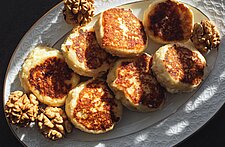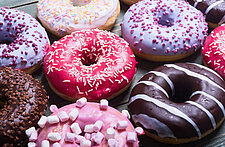Before discussing what foods, beverages, and flavors are preferred by people aged 12 to 20, consider one fact sure to get the attention of any food technologist, R&D manager, purchasing director, or marketing professional:
Gen Z consumers spend more of their money — a substantial 20% of their income — on food, more than any other previous generation. They don’t go to the shopping mall to spend quality time with their friends; they go to restaurants and chat over food and beverages.
What’s more, Gen Z loves to cook. More than 50% of this younger generation enjoy culinary activities, with more than a quarter of the generation making their own food and nearly 75% wanting to build on their cooking skills.
So, what food trends have we seen through our research at Symrise? The five big themes are:
-
Convenience
-
Wellness
-
Trust and transparency
-
Experience
-
Flavor
Let’s break down each category to share the Gen Z insights that will shape food and beverage trends for the future.
Gen Z Foods: Convenience
Compared to Millennials, Gen Z is 30% more likely to consume frozen and microwaveable meals. This isn’t just because their parents are busy. Research shows that 70% of the younger generation have complete control over their snack options.
These foods can include:
-
Microwaveable meals
-
Meal kits, including those marketed to kids
-
Snacks
-
On-the-go food
In particular, they want healthy and convenient foods, such as fruit, yogurt, and nut offerings. They look for organic labels and better ingredients along with ease of preparation. They’re less inclined to sit down for three meals a day, opting instead for healthy (and often indulgent) snacks.
Gen Z Shopping Habits Focus on Wellness
To best understand Gen Z’s habits when shopping for food and beverages, it’s important to know they consider food just one component of an entire wellness economy. This means they also care about physical and mental health, nutrition, exercise, and relaxation.
They care about eating clean, focusing on organic and veggie-centered meals. While 8% of Gen Z consider themselves vegan or vegetarian (compared to 12% of Millennials), those numbers are expected to rise over the next decade. They have an ethical interest in choosing plant-based foods and drinks.
Unlike other generations, they drink less alcohol and consume fewer drugs, except for cannabis. Mocktails are pushing to the forefront as a trend in Gen Z beverages. One example of another alcohol alternative is HopTea, an iced tea flavored with hops, like beer, but without sugars, additives, or any fermentation.
Gen Z flavor preferences also contribute to the surge in demand for meat substitutes and other plant-based products, especially over the last two years. In April 2017, plant-based foods saw $3.4 billion in sales. Two years later, that number jumped to $4.5 billion. Perhaps this isn’t a surprise, with big fast-food chains such as Dunkin, Burger King, Del Taco, and Red Robin offering plant-based alternatives in their restaurants throughout the nation.
Plant-based milks have also gained massive popularity. Oat milk is the new almond milk, with sales skyrocketing 425% in 2018 over the previous year. As environmental and ethical reasons encourage vegetarian and vegan commitments, dairy sales have plummeted. Some experts predict even more plant-based foods appealing to Gen Z flavor preferences.
Related: Key Characteristics of Gen Z for Food Manufacturers and Beverage Brands
Trust and Transparency: Marketing to Gen Z
Gen Z may be young, but they’re savvy. Nearly half the demographic — 46% — said they search out products that are honest when deciding how they make a purchase. They want their foods and beverages to be:
-
Clean
-
Organic
-
Natural
-
Without additives
-
Made with sustainable practices and ingredients
We’ve seen this in the marketplace already. Pepsi 1983 is made with cane sugar and no high fructose corn syrup. Prego Farmers’ Market has only simple ingredients. Harmless Harvest’s Harmless Coconut Water even bases its entire brand on trustworthiness.
When it comes to marketing to Gen Z, don’t greenwash. If you present a baseless claim, this younger generation can and will do their research and discover the truth. They use their comfort with digital connectivity to their benefit.
Don't forget to Subscribe to our weekly newsletter here!
Gen Z Flavors Should Be an Experience
There was a time when the plating of a meal or the design of a product was reserved for the fanciest establishments. Now, restauranteurs and food technologists know the importance of creating a multi-sensory experience for whatever they offer.
Think: Is this Instagram-worthy? Can Gen Zers take a picture of their food or drink experience and share it with their friends? Whether ordering ethnic cuisine or entrees made with exciting techniques, the younger generation wants to be impressed by aesthetics as much as by the ingredients and flavors.
Gen Z flavors are more about a personal brand. They want to capture and share their experiences with their friends and fans, and food brands can help. Along with using mobile apps and digital platforms to make the ordering and delivery process easier, they can also consider ways to market through social media pages.
Packaging can also play an essential role in the consuming experience. It’s not just new designs that matter; Some bloggers focus on ASMR, which stands for Autonomous Sensory Meridian Response. ASMR focuses on sounds, like munching on a crunchy honeycomb or a crisp snack chip or the hiss and fizz of a freshly opened carbonated drink. These sounds contribute to the Gen Z eating or drinking experience.
Flavor Stills Drives Generation Z Buying Habits
Just as the members of Gen Z are ethnically diverse, so is their interest in international cuisine. They want to try new flavors within familiar formats as well as simple, international treats like Hippeas, a brand of organic chickpea puffs. They tend toward foods with Asian or Hispanic flavors.
Generation Z beverage-buying habits focus on flavored waters and ready-to-drink sports drinks, coffee, and tea. Their sweet tooth is satisfied with ice cream, cereal bars, and energy bars. As far as savory foods, they enjoy:
-
Cheese-flavored snacks
-
Egg dishes
-
Rice or grains
-
Savory dips
-
Meat snacks
-
Ready-to-eat popcorn
Symrise research shows that 45% of Gen Zers consume rice or grains, egg dishes, and cheese-flavored snacks daily or weekly, while popcorn is only eaten occasionally. Dairy ice cream is a popular treat, as well as granola and protein bars.
Top Picks for Gen Z Food and Beverages
When it comes to the most beloved Generation Z favored international cuisines, pizza, American, Mexican, and Chinese top the list.
Beverages might be the biggest surprise of all Generation Z consumer insights. Research shows the most popular drink for this generation is plain water, followed by soda.
To best appeal to Gen Z, companies would benefit from staying fresh and dynamic with all food, beverages, and flavors. To learn more about our Gen Z initiative, contact us HERE.






